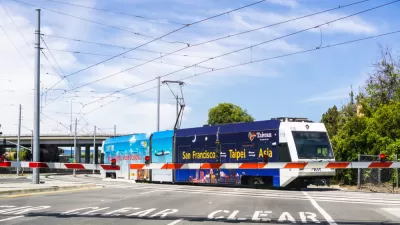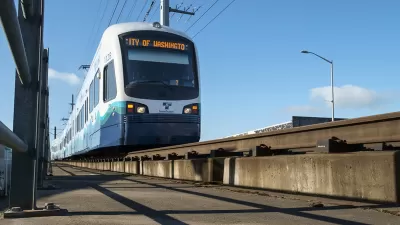Boston, Washington D.C., San Francisco, and Los Angeles—all major cities that have mulled transit fare increases in recent months. Eric Jaffe examines the numbers behind the continuous need for transit agencies to raise the price of a fare.
“The reason local agencies seem to need so many fare increases is that they do a poor job keeping the price of taking a ride near the cost of providing it,” writes Eric Jaffe. To further examine the gap between cost and price, Jaffe examines new data from the U.S. Department of Transportation.
After concluding that average fares per mile from 2000 to 2010 for the ten largest U.S. transit agencies didn’t change much (just a 1 percent increase a year). Jaffe then compares average fares per mile to the average cost of operating the service per mile over the same period. “In 2000, that [operating] cost was $9.05; in 2010, it had climbed to $10.82. That's an increase of 19 percent — or about 2 points a year — nearly doubling the growth rate of fares.”
In so doing, Jaffe recognizes “an ever-widening gap between what the biggest transit agencies spend running their service and what they recover from riders.” In fact, “In 2000, the top agencies recovered nearly 40 percent of their costs through fares. That figure has since dipped below 37 percent.”
Jaffe also examines the differences in fare recovery for different modes and identifies a culprit in the inability to keep costs down (hint: it’s not salaries).
FULL STORY: The Real Reason Mass Transit Fares Are Rising Across the U.S.

Maui's Vacation Rental Debate Turns Ugly
Verbal attacks, misinformation campaigns and fistfights plague a high-stakes debate to convert thousands of vacation rentals into long-term housing.

Planetizen Federal Action Tracker
A weekly monitor of how Trump’s orders and actions are impacting planners and planning in America.

In Urban Planning, AI Prompting Could be the New Design Thinking
Creativity has long been key to great urban design. What if we see AI as our new creative partner?

Massachusetts Budget Helps Close MBTA Budget Gap
The budget signed by Gov. Maura Healey includes $470 million in MBTA funding for the next fiscal year.

Milwaukee Launches Vision Zero Plan
Seven years after the city signed its Complete Streets Policy, the city is doubling down on its efforts to eliminate traffic deaths.

Portland Raises Parking Fees to Pay for Street Maintenance
The city is struggling to bridge a massive budget gap at the Bureau of Transportation, which largely depleted its reserves during the Civd-19 pandemic.
Urban Design for Planners 1: Software Tools
This six-course series explores essential urban design concepts using open source software and equips planners with the tools they need to participate fully in the urban design process.
Planning for Universal Design
Learn the tools for implementing Universal Design in planning regulations.
Gallatin County Department of Planning & Community Development
Heyer Gruel & Associates PA
JM Goldson LLC
City of Camden Redevelopment Agency
City of Astoria
Transportation Research & Education Center (TREC) at Portland State University
Jefferson Parish Government
Camden Redevelopment Agency
City of Claremont





























